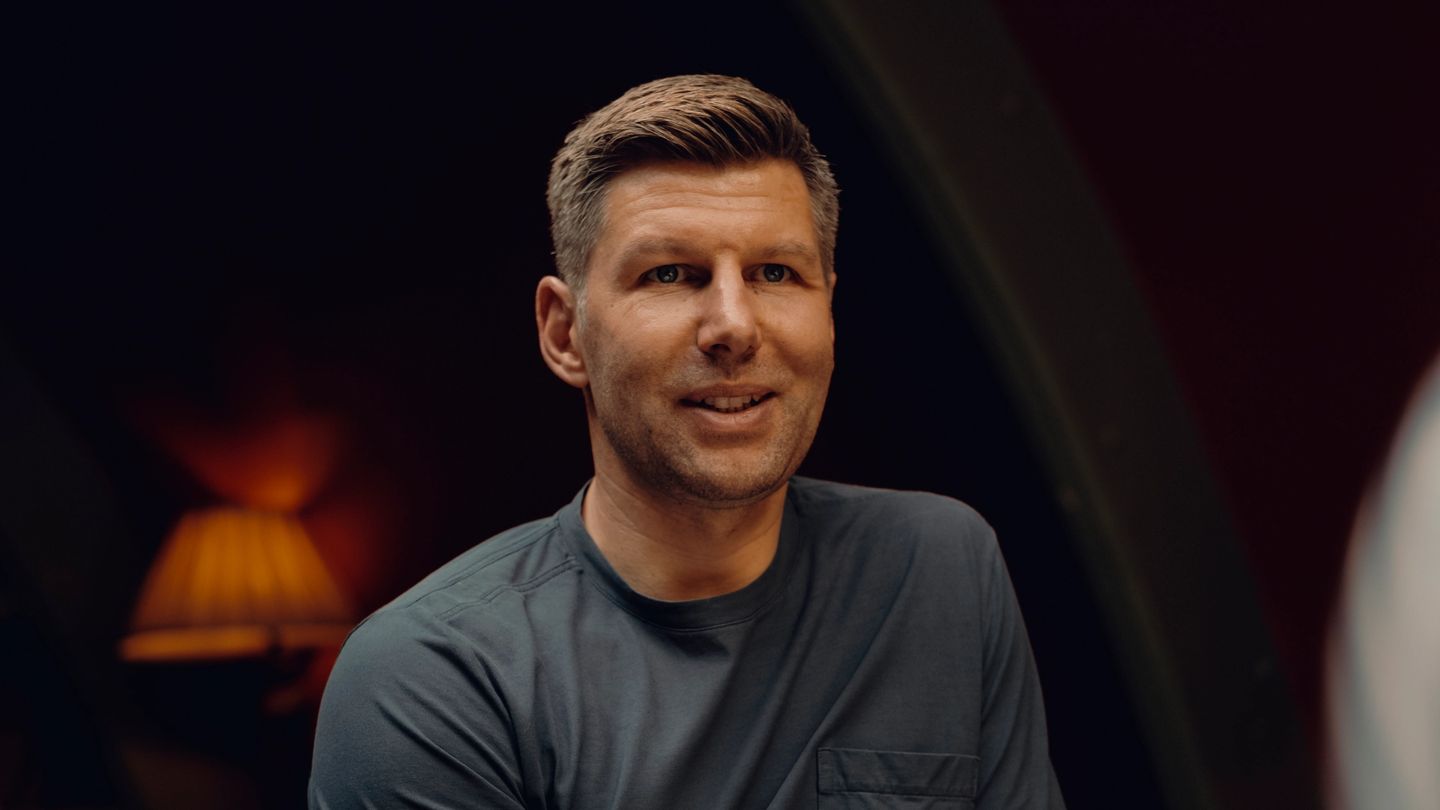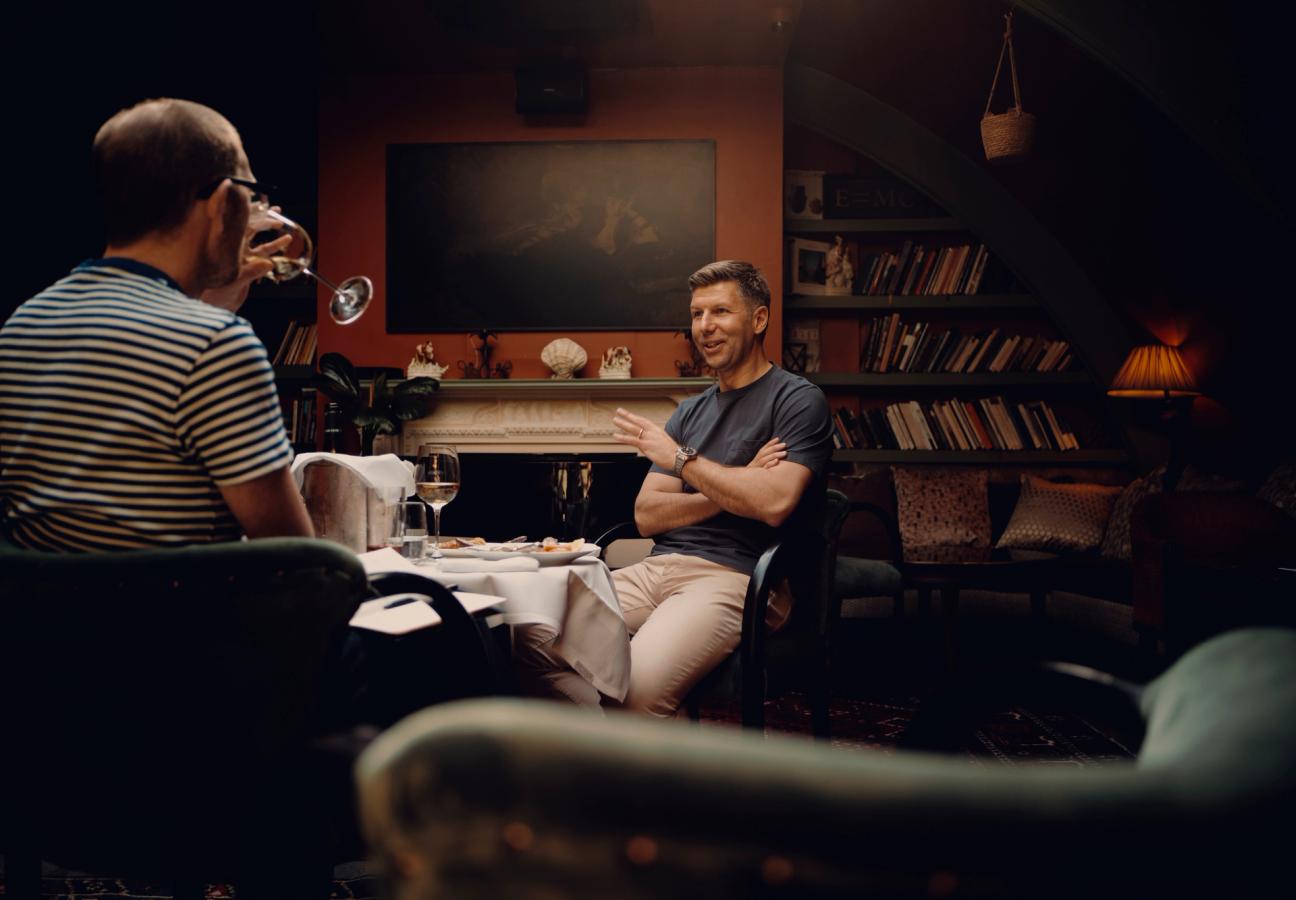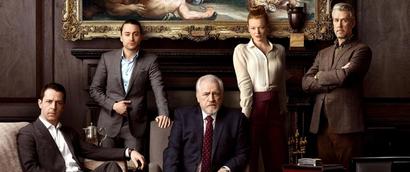

Out to lunch with Thomas Hitzlsperger
The footballer, CEO, TV pundit and L’Escargot proprietor on navigating a career change and the parallels between sport and restaurants
- Words: Alistair MacQueen
- Photography: Greg Funnell
The heart of London’s Soho isn’t the wildest of places to find a restaurant owner. In fact, on a gorgeous Thursday afternoon like today, you can scarcely wander down somewhere like Greek Street without tripping over senior managers, seasoned restaurateurs or hospitality chairmen taking an afternoon espresso on the pavement tables. And it’s in this landscape, at the legendary French restaurant – nay, institution – L’Escargot, that we settle down to break bread with its new owner (“I prefer proprietor!”): one Thomas Hitzlsperger, former German national player, West Ham and Aston Villa midfielder, and TV pundit for Match of the Day.
Our conversation begins as a saga of “finding the best light” in terms of shooting conditions for photographer Greg – a search that takes us from the restaurant downstairs to the green room above it, before finally settling on the capacious Snail Bar, site of the restaurant’s private members’ club at the very top of the warrenous townhouse that is L’Escargot.
Here, we choose to sit down with Hitzlsperger and be treated to a very delectable assiette of smoked and pickled fish, Gruyère, crême fraiche and truffle flatbread, followed by the earthiest and most flavoursome of Toulouse sausages. To accompany all of this, Hitzlsperger recommends a crisp Petit-Chablis by William Fèvre from the restaurant’s 325-plus wine list. Up here, at the very top of the building, a Parisian ambience is enhanced by a small bar, reams of literature and paintings depicting plein air subjects on the walls, and chairs and sofas from which any flaneur would be happy to spend hours filling their notebooks.
We’re here to talk about Hitzlsperger’s own route from footballer to restaurant owner – one that’s been typified by an entrepreneurial attitude to hard work, self-development and the willingness to embrace something new. After leaving his position as CEO of German football club VfB Stuttgart in 2022, he enrolled on a BEMS (Business of Entertainment Media and Sports) business management course at the Harvard Business School. Featuring an eclectic group of ex-athletes, tech, media and business people, the main thrust of this was to encourage attendees to become business owners in their own right, as opposed to becoming, say, a DJ (Djibril Cissé) or an actor-poet-philosopher (Eric Cantona). Though we need those too.
“I finished my role [as CEO of VfB Stuttgart] and was looking for a fresh challenge,” says Hitzlsperger. “Owning a new business was a new experience for me, and being in charge of something different means it’s also my responsibility what happens. I can’t make any excuses or blame any mistakes on anyone else.”
Becoming the head of any organisation in London, not least a restaurant, is no facile decision. Why choose such a revered place? “It’s because I love London,” he says. “I love being here and I love food, of course. Hopefully it’s going to be a huge success, and if not, I’ll still learn a lot from it.”
It was Frenchman Georges Gaudin who founded L’Escargot in 1927, ensuring that it lived up to its name thanks to the founder’s fervour for the slimy little wonders, which were farmed in the building’s cellars. Today, these gastropods are served with an unctuous garlic sauce for starters, rather than paraded around as was Gaudin’s wont. The restaurant, though, has never lost its bohemian elan and enduring appeal that attracted celebrities and royals such as Mick Jagger, Elton John and Princess Diana, and still remains a beacon of high-quality fare as well as a bastion of the ever-decreasing ‘long lunch’.
This only burnishes its allure and solidifies its reputation, which has enabled it to weather the numerous financial and transient hospitality storms of the past 20 years in the area. Hitzlsperger is adamant that owning L’Escargot means he can put even more years on its already formidable age. Given the propensity of ex-footballers for branching out into unexpected or unfamiliar areas of business after their playing careers, does he feel as if he’ll come into criticism for his decision?
“Just a little bit,” he says with considered equanimity. “Being here in London and owning this makes a lot of sense, because, like running a football club, you see the legacies and responsibilities attached to the position. L’Escargot has been here for such a long time, and I’m just one small part of it in its long history. I’m going to try everything I can to hope to ensure that it can be here for another 100 years.”
Hitzlsperger had been a regular diner at the restaurant since 2014, one of many bewitched by its ineffable ambience and approach to dining. When he finished his BEMS course, he wanted to develop his entrepreneurial skills so approached L’Escargot’s affable chairman, and eminence gris of the London hospitality scene, Brian Clivaz. Hitzlsperger said he would invest in the business as long as Clivaz stayed on board. Today, it’s Clivaz that Hitzlsperger can trust to run L’Escargot when he’s out of the restaurant, commentating on any of the football matches around Europe.

What does his day-to-day involvement consist of ? “Really, it’s my job here to notice things – is the service OK, is the music too loud? I’m not here to get on peoples’ backs. I trust the staff and they know their roles, but it is up to me to decide how we survive in a changing environment. The challenges are huge but you have to ensure that the brand remains appealing to people. With a French restaurant – L’Escargot! – the name itself might put people off, but our challenge is to ensure that this doesn’t happen. We want people to come here, know they’re welcome and enjoy the experience.”
Hitzlsperger’s talk of ‘brands’ is redolent of his experience running football clubs, which are by extension essentially brands themselves – much-loved by their followers and braided with their own histories, traditions and back stories. He admires the ubiquity of say, Goyard bags, as well as how Pret a Manger seems to have gone from the little coffee shop in Shoreditch he would visit in his West Ham days to the international behemoth it is today.
“As a restaurant owner, it’s a challenge to be able to scale in the way that huge brands or franchises operate,” he says. “Some people try to become the biggest in their industry but it’s still very different to do what we do here. Also, it’s not just about the menu here – we have a club, too. We invite interesting and fun visitors to the place, and put on fun events for people to remember. Chain restaurants struggle to do this authentically – it’s in our nature to try and be different and be exceptional. When I was working in football’s senior levels, I was slightly more demanding, probably because I have more experience in the industry. Now I’m here at the restaurant, I recognise and respect that people have more experience and knowledge than me.”
It’s a humble attitude that’s a world away from the aggressive managerial style well documented, even celebrated, in some restaurateurs. I put it to Hitzlsperger that – seeing L’Escargot through a business lens – the restaurant has even more parallels with the world of sport.
“Of course, there’s a huge similarity,” he agrees. “Managing and employing people that enhance the business – both of them are very emotional, everybody has an opinion. You don’t have to be an expert to enjoy a meal, or a game of football. And it goes both ways: if you give people a great time, they tell their friends and people come in. If they have a bad time, it’s difficult to bring them back. With the immediate response of online reviews, of course you feel the pressure – if we don’t deliver then people will go elsewhere. It’s about trying to please them without losing your DNA.”
Hitzlsperger, of course, has his own formidable network of people to introduce to L’Escargot. For his football friends, Hitzlsperger admits that it can be hard to entice them here especially when, say, Novikov, is having a moment. So what is his strategy to counter this? “When people come here, we show them around and bring them up here where they might see Carl [the piano player] who’s here playing on a Friday and Saturday evening – it’s quite an experience! I’m not here every day, so for anyone coming by, they must know that I might not be here one day, but I’ll be back on Tuesday. Brian leads the way on food and on the Snail Club where we have book launches, readings and special dinners. What’s important is that we’re seen as a relaxed bistro-type of place. It’s not just for people who wear suits.”
Hitzlsperger does look like he’s just thrown on the nevertheless semi-considered wardrobe of post gym-session wear, loose trousers and a dark top. “I’m wearing a T-shirt now, but this is what we want,” he says. “Too many people I know think this is a fine-dining restaurant, where you have to put on suits and ties to come into, but no, we’re in Soho. You can wear shorts and you can even bring your dog.” It’s a philosophy that Clivaz espouses – his pooch Doris was often spotted with him in and out of the restaurant until last year, when she took her last walk. The tradition continues with Clivaz’s new bulldog, Gladys.
“The whole attitude to behaviour is different,” Hitzlsperger adds. “ We just want you to relax and enjoy the food. Everything is eclectic here, we don’t judge people on how they dress or what they order.”
I pour another glass of the Petit Chablis to accompany the fine herring, and offer him one. Hitzlsperger politely declines, explaining that he’s stopped drinking for three weeks now. Still grounded in health and fitness, he retains a seriously enviable waistline for someone of his age, as well as that as restaurant proprietor. Did he expect to be around food and drink so much when he took over?
“When you’re here in Soho, alcohol is everywhere but there’s definitely people who can’t control it. You drink responsibly and it can be fine. Here, I want people to have a great time, and alcohol can be a part of it. But also, to come here and know everything about French wines, you’d have to drink a lot of it. And that’s not my biggest talent. I definitely enjoy it, but there are people here who can advise and recommend the wines.” He sips a Diet Coke. “I love my food, but I’m at that age where I can’t eat 400g of meat at night. My thing was always to create a place where either Brian or I would love to eat every day. I’m trying to stick to fish or vegetarian dishes at the minute. I don’t mind a chateaubriand… Tournedos Rossini, I’d eat all day long! But I’d make sure there’s some vegetables with it.”
I ask him if he suffers from that entrepreneurial danger of losing interest in their projects as time goes on. “When I came for the first time, I understood this was not just another place in Soho to eat,” he says. “Discovering the variety, fun, legacy and stories that have taken place – in these rooms, and those who regularly ate here I was almost in awe of it! But I still have to ask myself all the time: ‘Is it special to me?’ Because then I can sell it to other people. L’Escargot is so much more than just a restaurant. It sometimes feels like a holiday, especially when it’s sunny outside, like it is today. I can never tire of that.”
It is clear that Hitzlsperger gets satisfaction, too, from satisfied customers. “Sometimes I enjoy standing at the front, taking the coats in,” he says. “Most people don’t know me or what my role is in the restaurant. So when they leave, I ask them if they enjoyed dinner and had a good time. One of the best ones I had was when I handed one gentleman’s coat back and he gave me £2, which was very sweet. I didn’t know what to do with it! But it was a great experience. Football’s taught me a lot about business. Like I said, this is an emotional business.”


